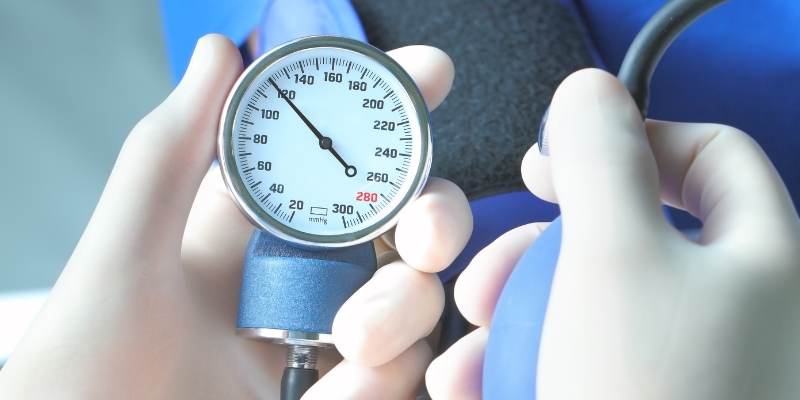High blood pressure, usually an adult problem, is becoming a juvenile issue. This change from adult-onset hypertension to early-onset blood pressure concerns has highlighted significant questions concerning the effects of high blood pressure on young people. A recent study reveals a strong link between juvenile blood pressure and long-term brain health, challenging the idea that high blood pressure only harms the cardiovascular system.
This problem might change how we view blood pressure and brain function. Hypertension's effects on heart health are well-known, but studying how blood pressure variations in adolescents influence cognitive well-being is new to public health. This article discusses current research on the often-overlooked effects of increasing blood pressure in childhood and the need to tackle this problem.
This study goes beyond hypertension as a heart disease risk factor. It explores the complex relationship between blood pressure and brain health. These results provide light on the long-term effects of juvenile hypertension. High blood pressure in childhood may affect cognitive health and well-being in adulthood beyond the immediate physical consequences.
This article examines current research's essential results and their implications for people and public health programs. We hope this raises awareness of the link between juvenile blood pressure and brain health.

The Study:
Methodology and Data Collection:
The relationship between teenage blood pressure and brain health requires careful examination. Researchers used rigorous data-gathering procedures with thousands of participants in these experiments. Researchers needed longitudinal data monitoring to follow blood pressure from birth through maturity. Cognitive tests and modern brain imaging supplement this information to show each participant's health trajectory. Demographic and lifestyle characteristics were also explored to strengthen the study and account for confounding factors.
This thorough methodology enabled a comprehensive analysis of the possible link between blood pressure and brain function, revealing how these factors interact over time.
Key Findings and Alarming Trends:
Alarming trends in the study have highlighted the increasing blood pressure of younger people. The research found a link between childhood high blood pressure and adult brain health issues. These results emphasize the need for early intervention and prevention for public health officials and people.
The consequences of these results go beyond medical research. They may change public health policies to prioritize blood pressure monitoring and management in young people to protect their cardiovascular and cognitive health.
Blood Pressure and Brain Health Relationship:
Understanding the Link:
Comprehending how high blood pressure affects blood arteries is vital to comprehending the brain-blood pressure link. High blood pressure may damage blood vessel walls, causing atherosclerosis. These vascular alterations may reduce cerebral blood flow, limiting oxygen and nutrition availability to the metabolically active brain. By studying its physiological roots, researchers want to understand how high blood pressure affects brain function.
Previous Studies and Neurovascular Evidence:
More study is being done on the complex association between hypertension (high blood pressure) and cognitive deterioration. Previous research has shown that high blood pressure increases the likelihood of cognitive deterioration in older persons. In those with high blood pressure, sophisticated neuroimaging has shown brain vascular damage.
This research emphasizes the need to study this vital health problem. This raises questions about public health, professional practice, and the necessity for early blood pressure treatment.
Impact on Cognitive Function:
Cognitive Decline and Aging:
Teenage high blood pressure may have long-term effects. Research shows that high blood pressure may increase the chance of cognitive loss, including Alzheimer's disease.
This link between blood pressure and cognitive aging raises issues regarding cognitive function throughout time and emphasizes the need for early risk mitigation.

Cognitive Domains at Risk:
Elevated blood pressure may harm several cognitive functions. They include memory, attention, and executive function. These cognitive abilities are necessary for everyday chores, academic success, and quality of life. Therefore, knowing how blood pressure changes affect various cognitive areas is crucial for people and the healthcare community.
Researchers want to inform lifelong cognitive well-being methods by extensively investigating how blood pressure affects diverse cognitive functions.
Lifestyle Factors:
Dietary Choices for BP Control:
Dietary choices affect blood pressure control. A diet rich in fibers, whole grains, lean meats, an low saltin and saturated fats will help control blood pressure. These diet changes improve brain function and cardiovascular health by providing critical nutrients. Encouragement, particularly in youth, to adopt and maintain certain eating habits may help regulate blood pressure and general health.
Physical Activity and Exercise Benefits:
Physical exercise is another key to blood pressure control. Exercise helps regulate blood pressure and improves brain health and cognition. Exercise improves blood vessel health, neuroprotective chemicals, and neuroplasticity, critical for lifelong brain health.cPromoting physical exercise at a young age benefits cardiovascular and cognitive health.
Stress Management Techniques:
Mitigating Stress-Related Hypertension:
Learning stress management strategies like meditation, mindfulness, and relaxation may reduce this risk. Stress management may improve blood pressure regulation, minimizing the risk of cardiovascular and cognitive health issues. Focusing on mental and physical health via stress management is a comprehensive approach to well-being.
Sleep Patterns and Their Impact:
Poor sleep may severely alter blood pressure control. Healthy sleep habits are essential to blood pressure management. Sleep is critical for brain health, cognitive function, and physical healing. The brain consolidates memories, clears poisons, and rejuvenates during sleep, making sleep patterns vital to cognitive health. Sleep hygiene and treating sleep disturbances are crucial to good blood pressure and brain function.
Conclusion
Finally, increased blood pressure in youth may affect long-term brain function, highlighting a crucial part of well-being. By studying the complex link between blood pressure and the brain, we now understand how early-life blood pressure changes may affect cognitive health in adulthood and beyond.
These discoveries affect people, public health, and healthcare procedures. They emphasize preventive therapies, lifestyle changes, and early blood pressure monitoring to protect cardiovascular and cognitive health.
This relationship raises questions for research, healthcare practitioners, educators, parents, and politicians. It urges more research into this complex topic to better understand the processes and improve prevention.
As we investigate blood pressure and brain health, we want to improve brain health and cognitive performance across generations. This effort promises a better cardiovascular system and a brighter, more robust mind for life, making it crucial. Addressing juvenile blood pressure issues opens opportunities for a more intellectually stimulating future for all ages.







